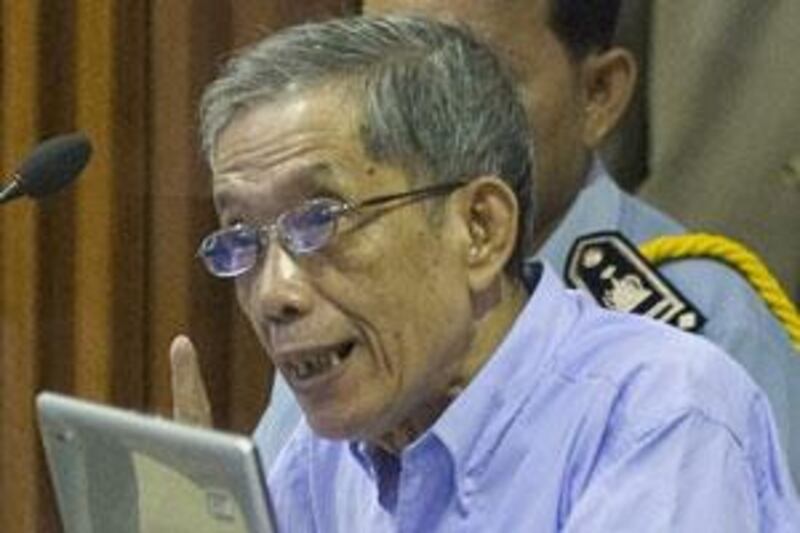PHNOM PENH // A notorious torture centre boss went before Cambodia's genocide tribunal today for its first trial over the deaths of an estimated 1.7 million people at the hands of the Khmer Rouge regime more than three decades ago. King Guek Eav - better known as Duch, who headed the S-21 prison in Phnom Penh - is charged with crimes against humanity and is the first of five defendants scheduled for long-delayed trials by the UN-assisted tribunal.
The hearing today was procedural, and testimony was expected to begin only in late March. Duch, driven to the hearing in a bulletproof car from a nearby detention centre, intently followed the proceedings in a courtroom packed with 500 people. "It is not only me wanting justice today. All Cambodian people have been waiting for 30 years now," said Vann Nath, one of less than 20 survivors of S-21, who attended the hearing.

"I look at Duch today and he seems like an old, very gentle man. It was much different 30 years ago." Vann Nath, who survived by painting and sculpting portraits of Khmer Rouge leader Pol Pot, described Duch as a "very cruel man". Duch, 66, is accused of committing or abetting a range of crimes including murder, torture and rape at S-21 prison, formerly a school, where up to 16,000 men, women and children were held and tortured, before being put to death.
"This first hearing represents the realisation of significant efforts to establish a fair and independent tribunal to try those in leadership positions and those most responsible for violations of Cambodian and international law," the presiding judge Nil Nonn told the chamber. Duch has made no formal confession. However, unlike the other four defendants, Duch "admitted or acknowledged" in some of the 21 interviews by investigating judges that many of the crimes occurred at his prison, according to the indictment from court judges.
Duch, who converted to Christianity, has also asked for forgiveness from his victims. Duch has been variously described by those who knew him as "very gentle and kind" and a "monster". "Duch necessarily decided how long a prisoner would live, since he ordered their execution based on a personal determination of whether a prisoner had fully confessed" to being an enemy of the regime, the tribunal said in an indictment in August.
In one mass execution, he is alleged to have given his men a "kill them all" order to dispose of a group of prisoners. On another list of 29 prisoners, he is said to have told his henchmen to "interrogate four persons, kill the rest". After the fall of the Khmer Rouge, Duch disappeared for two decades, living under two other names and as a converted Christian before he was located in northwestern Cambodia by a British journalist in 1999. Taken to the scene of his alleged crimes last year, he wept and told some of his former victims, "I ask for your forgiveness. I know that you cannot forgive me, but I ask you to leave me the hope that you might."
His defence lawyer Francois Roux said today that his client has been in detention for nine years, nine months and seven days, adding, "This situation is unacceptable." Duch's hearing before the tribunal was expected to last two or three days. The trial comes 30 years after the fall of the Khmer Rouge, 13 years after the tribunal was first proposed and nearly three years after the court was inaugurated.
*AP





